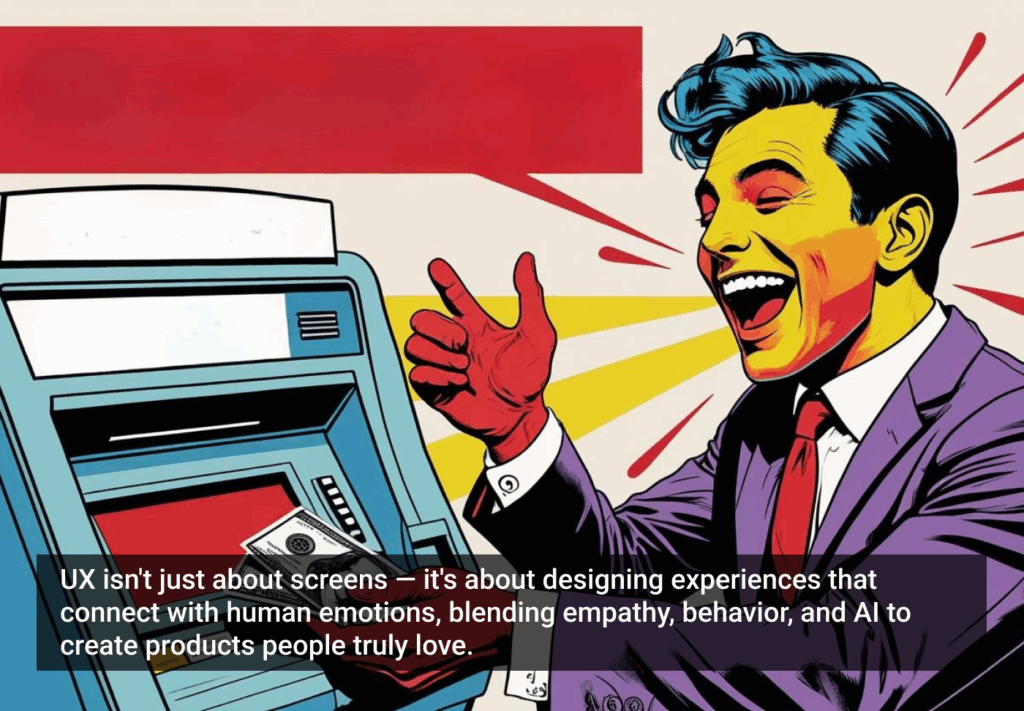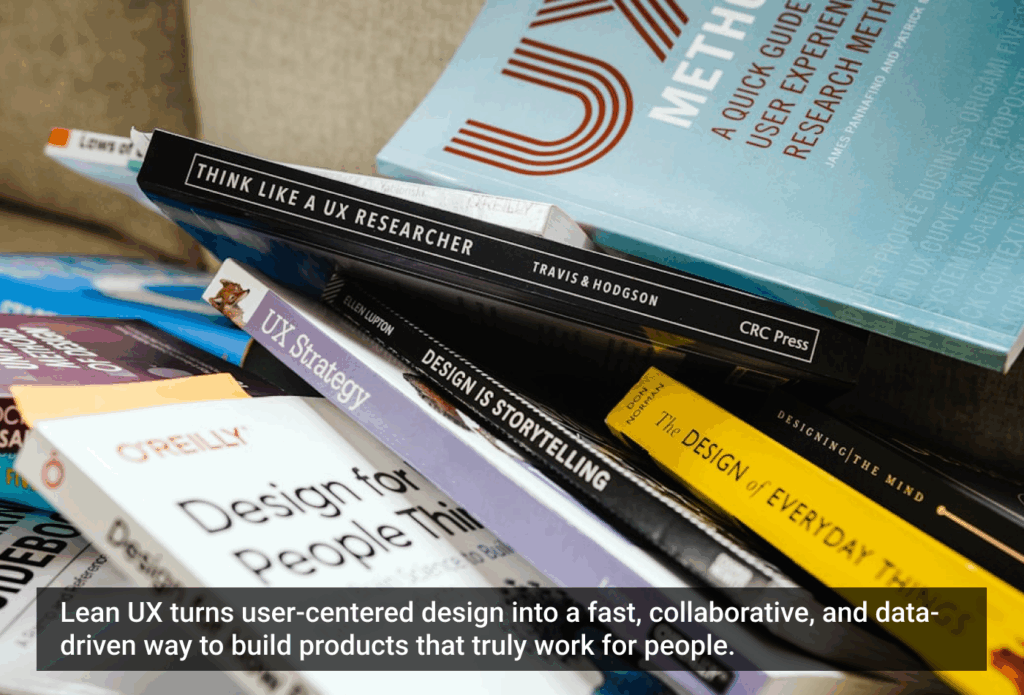The UX coffee hours, ADPlist, Design Buddies, Floxies, Adelante, UX Copenhagen — various mentorship platforms for aspiring UX professionals are thriving, especially since the pandemic hit. There is more need in the market than UX writers can realistically offer. I ask myself: Should UX experts have to explain themselves why they do not mentor, either in those communities or one-on-one? Spoiler alert: No, they shouldn’t.
Why I think protecting all of our mental health will save our community’s energy for more sustainability:
- Mentorship comes in many forms and not all of the answers you’re looking for belong in the chat with an experienced UX mentor.
- Remember: UX mentors offer their spare time for free. Most of the time, they want to give back to a fast-growing community in which they had great mentors as well.
- Platforms filter available mentors for you and offer a vast amount of resources. Make use of them wisely.
- Principles from “Essentialism” by Greg Mckeown can really help your approach as a mentee, by zooming in on your challenges and sorting out the right help for their career advice and how to break into the highly sought after UX writing field.
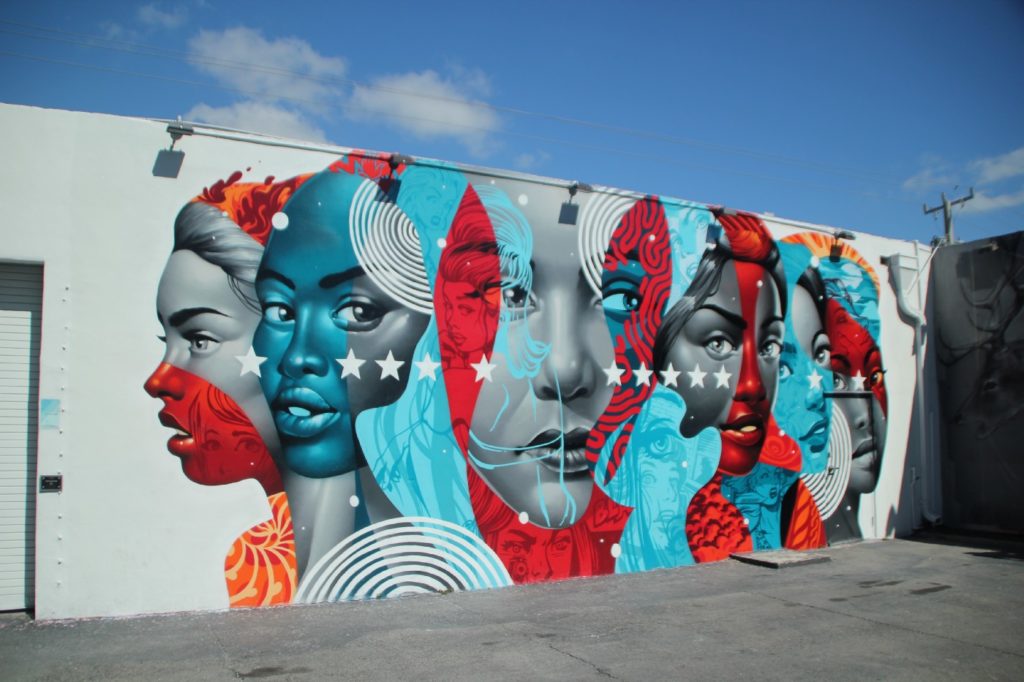
There is a mentorship gap. It is invisible. But it is tangible.
You can feel it, hear it — like it is white noise in the background. A vacuum of some sort. I am still unsure where it comes from, but our community’s members are struggling, looking for help in any career stage. Maybe it is like that in all industries, for all people. Speaking from my experience, I see so much help offered by devoted people eager to support others.
Whether they want to improve things for those coming behind them,
- by giving tips and showing them loopholes to jump through,
- or they are capable of valuable portfolio critique,
- or they offer helpful advice for job hunting and how to climb the career ladder,
- or they ease their suffering from impostor syndrome,
- or they encourage their entrepreneurial spirit to become a UX freelancer.
Being mentor and mentee — seems only logical
I had a handful of mentors throughout my career’s lifetime, almost all of them incredibly helpful to me. I have been a mentor myself more times than I can count, most of the time by accident and not by design (yet). But repeatedly I get a feeling that I just cannot seem to get rid off: There is no way UX experts can carry the exponentially growing need of people interested in the UX field on their shoulders alone.
To clarify: With “UX experts” I only speak of those who 1. can mentor, 2. want to mentor and 3. are not in danger of burning out while doing it. I witness a rising demand and people trying to help, being also pushed to help without really being able to meet these expectations.

UX communities are a vital part of our industry
Almost all of these platforms enable UX writers and content strategists to offer their mentoring qualities, whether through 1:1 sessions, seminars, webinars or group coaching:
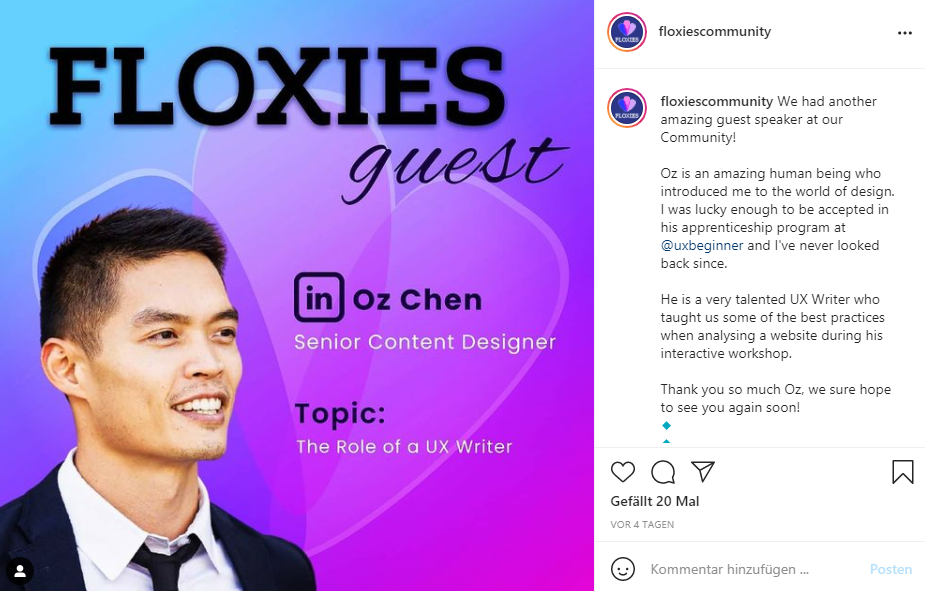
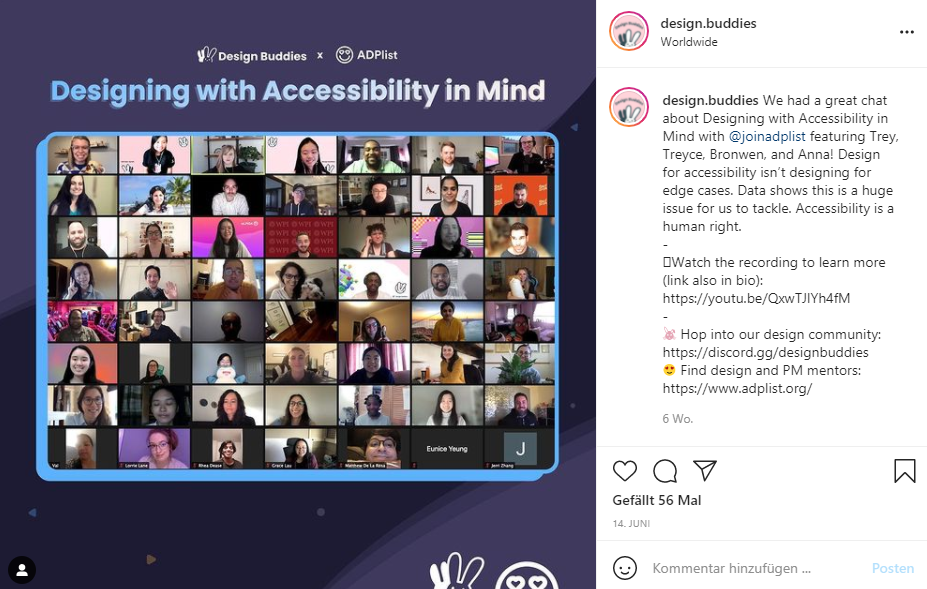
The ask for help is loud — and the urge to help can grow strong
These aforementioned UX communities are a great success, and I applaud every person offering their expertise to help others. But this “work outside of work” also might have several pitfalls we must look out for. The body of UX professionals needs to find a smart way to offer their career support so it can sustain itself in the long run. And I don’t mean portfolio critique or design advice.
Maybe this approach I’m looking for to protect all of the parties’ mental health, time and energy, is to channel mentees’ needs in a reduced, more essentialist manner. In an ideal world, mentors wouldn’t burn out and mentees would get the right help they are looking for.
Together with two UX writing experts, Katharina and Barbara, I run a German UX writing community, in which we started out with a book analysis of “Microcopy” by Kinneret Yifrah. But basically, this network came to life because UX writers working with the German language had no platform or community.
We had been manoeuvring through our careers and jobs by building on the experience of mostly anglophone UX writing communities all over the world. (Of course, it could also be Spanish or an Asian language, making up a large chunk of the world’s languages.)
Imitating life instead of creating it?
The problem that lies within all the relevant research you do yourself is that it is biased most of the time. You mostly look for the answers to a particular problem you encountered. But the German UX writing meetup uncovered a whole other issue of imitation or lack thereof.
Many folks were reaching out to us as a group or individuals to get help with making it in the field of UX writing. Essentially asking: “How can I make it, too, as you did?”. And as you can imagine, we cannot answer with a blueprint for each individual who is asking us — you cannot imitate a person’s choices and thoughts behind roads taken. It would be best if you created them yourself. This is where the space of mentorship with a focus on your career begins.
Career-focused mentorships often “just happened”
As I was already mentoring others — providing feedback on where to apply, how to further hone your writing skill or how to structure a writer’s portfolio — at the same time, I was a spectator at various UX meetups and other gatherings as a place for people seeking mentor’s advice. Usually, this advice can be split into three main meta groups:
- skills (design, portfolio, experience, education, networking)
- career (networking, job applications, organizational advice)
- personal (psychological support, such as battling imposter syndrome)
As opposed to general career advice, there is expert-specific support for your career and your skillset. You can most certainly seek individual sessions offered on the various platforms. It is crucial to come prepared with a game plan for these chats. Don’t just wing it. This is highly valuable time for both of you, so pick the specifics you might need help with:
- how to ace interviews at a specific company or in a certain field, such as AI,
- how to level up their existing portfolio’s game,
- or how to transfer from one specific UX field (interaction design) into UX writing.
By zooming in on particular challenges that need solutions that only industry experts, experienced practitioners and UX mentors can offer their mentees. Be mindful: Can your skillset-focused issues be answered more efficiently in a group session? Do you might want to save your career-focused questions can be tackled with a one-on-one session. Prioritize them, so you don’t overload the time frame.
Personal mentorship and self-development is whole other story — maybe for a whole other mentor
Personal coaching, self-improvement and psychological work — depending on what you are struggling with — is something you can certainly touch upon during expert sessions, but try to feel out the right time and place to engage in such a conversation.
You could also do your homework beforehand — in groups, on Medium, or using Google Search. It might be something you think a mentor can answer as a side note, but there is no guarantee they feel pressured to help you with advice not coming easily to them, just so they can support you. Because no matter what: the mentees are really important to all kinds of mentors.On the hunt for a UX writer job? Stand out of the crowd with a UX writing portfolioApart from transitioning into this field, training and getting certified — plus experience through practice in courses…bootcamp.uxdesign.cc
The alarming rate of “going rogue” in pursuit of mentors
Again, all those communities offer great support and help to others, in a very logistically channelled way as well. The people behind those platforms are a part of our welcoming, supportive and most of the time inclusive community — that still has a long way to go, don’t get me wrong. Especially communities for marginalised folks such as Blacks who design, Floxies or QTBIPOC Design are leading the way to a more accountable and sustainable future — because being othered your whole life also influenced the way you approach skill, career and personal development.
But still, there is something we cannot seem to quite shake off with all the online platforms we have at our disposal: Mentees still seek advice directly from mentors in addition to the communities — which can be very hard to turn down, especially if there is a familiar hardship they sense in that mentee’s journey, a nagging feeling they might just be the right person for them or you simply have a hard time saying ‘No’ to someone’s virtual face.
A senior UX peer, a mentor you can book for a session online, told me how hard it lays on their shoulders that they cannot quite tell if they are “actually helping someone”, especially people asking very general questions. I felt that.
Why the mentors’ mental health is at the heart of mentorship
My observations also tell me these cool mentoring people share one mindset: they are truly passionate about helping others. So much passion and wanting to help and give back that it might be taking a toll on their mental health in the long run.
Even if I don’t want to focus on the unsalaried quality of this work too much, money still matters. If mentoring was your side hustle, your main job ideally would have reduced hours, so neither have to take up all of your time and energy while adding more on top of that. So please, as a mentee, value and cherish their work time with you:
- Ask your UX mentors the essential UX questions you need to be answered — by them. Search the web high and low before asking something that is on the first page of those results. I said what I said —I am not trying to be mean but to really save all participants of any mentoring session the time and energy and to really zoom in on how this UX expert can help you.
- Please do your research about them. You should be picking your mentors not because they were available but because they are a match to your challenges — at least somewhat along those lines.
- Don’t cancel right before the session if it isn’t really an emergency. Try to show up 100% of all calls. Confession time: I am very bad at keeping all of my calendars in check, and I am working on it. But making an effort will show. Be honest — first and foremost to yourself.

Pro Bono mentorship is a gift — not to be taken for granted
Back to the dilemma of having to say ‘No’ to others. Imagine that manifold. Daily. Sounds blown out of proportion? My spidey senses tell me, it is the reality to many of our communities’ more well-known and acclaimed members. Podcaster, Senior UX Writer at Spotify, teacher, consultant, and poet —Nicole Alexandra Michaelis serves our community a great deal already. I noticed two very similar postings, but an exponentially growing sense of frustration (rightfully so!).
Keeping in mind that these posts on LinkedIn and Twitter are a long-stretched, pandemic-infused 6 months apart, to me they serve as a symptom of the growing trend in our inviting — and in comparison to other fields of UX design still rather tiny — UX writing community. People wanting to break into the field or advance their careers seem to pressure the more popular UX writing folks to mentor:
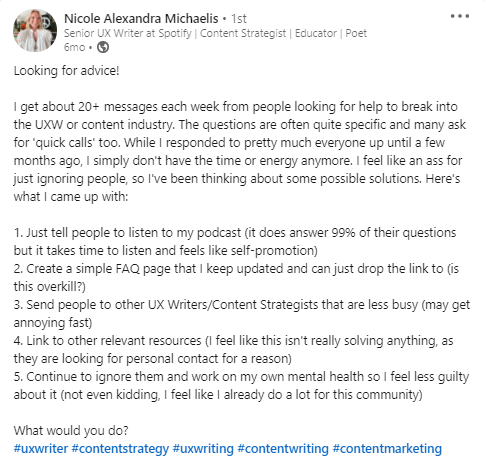
The amount of people that get pissed off when I say I can’t mentor them because I don’t have the time…like…how privileged are you?
— Nicole A. Michaelis✨ (@nicoletellsit) July 28, 2021
But sustainable, healthy mentoring is given without force, only then it will also serve the mentees best. Not everyone can or will mentor. Period. They might have families that need them, jobs that are demanding or anything that is none of your business. Decisions without justification need to be respected. I will say it again, louder: Mentorship should be offered, not being asked for. Why? Because all the platforms mentioned already show you available folks — or the feature on LinkedIn where you make yourself available for mentoring others. If they can, they will.
To add to a single person’s voice that was Nicole’s, this LinkedIn post of Jessica Smith, founder of the Adelante UX Writer Community, is chiming in and speaking volumes:
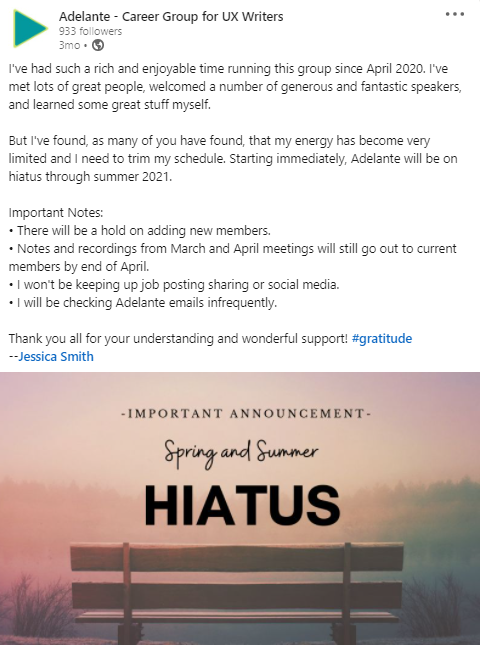
A connection between mentorship and mental health: Essentialism
“Essentialism is not about how to get more things done; it’s about how to get the right things done. It doesn’t mean just doing less for the sake of less either. It is about making the wisest possible investment of your time and energy in order to operate at our highest point of contribution by doing only what is essential.”― Greg Mckeown, Essentialism: The Disciplined Pursuit of Less
I loved the book “Essentialism” by Greg and I recommend it to anyone, no matter their field or background. Tone down your lists and demands, breathe through your panic and despair. Reduce your expectations. Be mindful, be aware and be grateful.
If you want to mentor, go for it and try it. I love helping out, but it’s hard to find the right dose where it is still effective. Check your availability, your life’s challenges, your energy levels. It is an ongoing process. You can start and stop whenever.
If you seek mentorship, take a step back and try to feel out who will be the right fit to support you. What will you ask in 20 minutes to confirm that this mentor is right for you? Which other struggles can you take with you to someone else — a family member, a psychologist, a career coach? And most importantly, since this is step one: which questions can you answer yourself by thoroughly researching them? Thank you in advance.
Remember the essentials, and wisdom will follow, or as Greg puts it:
“It is about making the wisest possible investment of your time and energy in order to operate at our highest point of contribution by doing only what is essential.” ― Greg McKeown, Essentialism: The Disciplined Pursuit of Less






